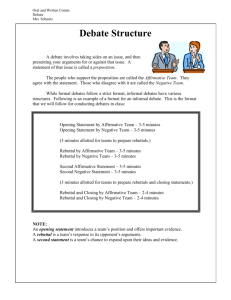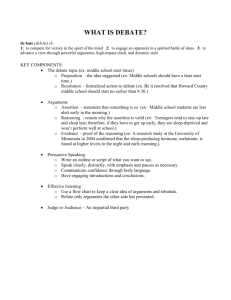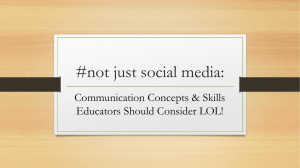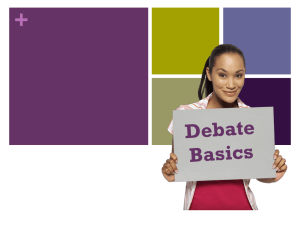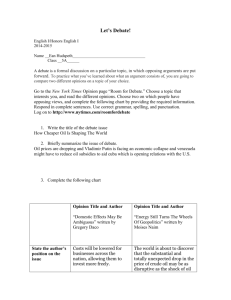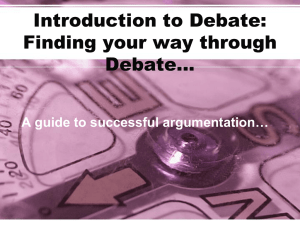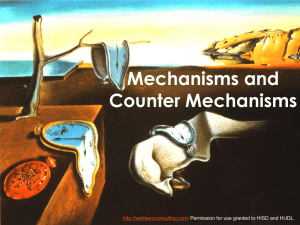Lincoln-Douglas Debate
advertisement
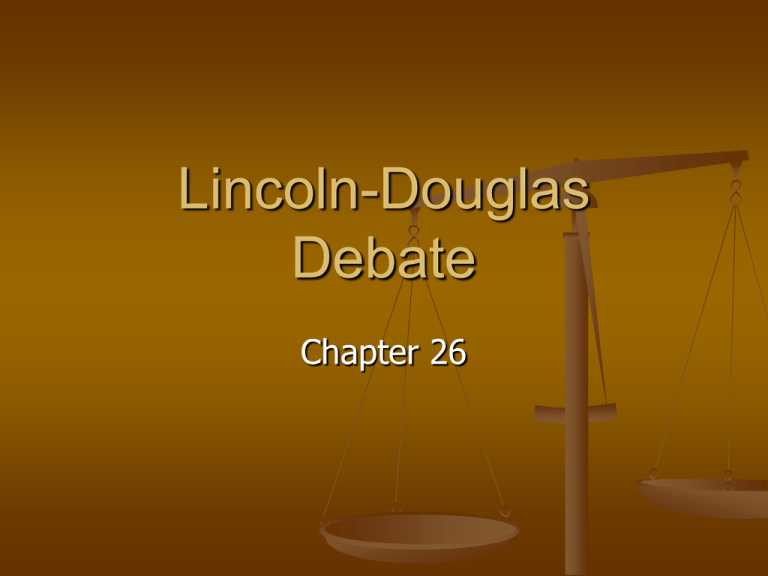
Lincoln-Douglas Debate Chapter 26 Historical Perspective Abraham Lincoln debated Stephen Douglas On such issues as slavery and states rights These debates are value based For example: Resolved: that slavery in the south is morally wrong. Background Research-Same Define terms Define problem/controversy Questioning Develop arguments (prepare case) Gather evidence Rebuttals Delivery-more important in this debate style Evidence Should focus on evidence that supports your philosophical values Focus less on “how much evidence supports” and more on “how you support your values” with the evidence and logic Values “the preference placed upon an action, object, idea, or person based on individual or social worth” Values are neither right or wrong Description of what is preferable or ideal We all have a set of values that contain: social, political, religious influences Conflicts occur with others because of values Category of Values Moral-judgments of good/bad, right/wrong Artistic- what is beautiful or ugly, pleasing/displeasing Pragmatic-what is practical or efficient Political-democracy, justice, and rights Values Terminal-your core values that deal with peace, freedom, salvation, accomplishments Instrumental-help achieve core values Example: Peace can be achieved through courage and self-control. Values are arranged in the order of importance to you Values Common debated values are: achievement, democracy, equality, freedom, justice, liberty, privacy, progress, pursuit of happiness, and security. Values They are preferences for how the world ought to be. Context influences our value system. (the environment we are operating in) Values are universal (basic needs and motivations the same) Individuals act upon their values-by voting, treatment of others, etc. Wording of Value Proposition Use “should” or “ought” in the proposition. The ideal will be supported by the affirmative. The negative will counter this “ideal” with a different world view or “ideal.” Policy versus Value No affirmative plan No stock issues Base your debate on differing definitions, real-world models, premises, criteria, and refutation of opponent’s analysis Two types of L-D Debates Philosophical-comparison of two “core” values Example: Resolved: Liberty is more precious than law. Two types of L-D Debates This second type of debate topic asks for the resolution of judgmental declarations or statements of fact. Example: In a democratic society, felons ought to retain the right to vote. Format of Debate Two people Affirmative has one more speech than the negative Each speaker get gets equal time though Format of Debate Affirm construct – 6 minutes (Scripted speech- try to memorize) Cross-exam by neg- 3 minutes Negative Construct- 7 minutes (scripted speech plus some rebuttal) Cross-exam by affirm- 3 minutes Break 5 minutes Format of Debate Affirmative rebuttal – 4 minutes Negative rebuttal – 6 minutes (plus summary of arguments Affirm rebuttal – 3 minutes (plus summary and end with a “bang”) To Prepare for Debate List values that relate to the proposition Write the strengths and weakness of each value in terms of defending or opposing the proposition To Prepare for Debate-Choose Model Develop a model-What is this? A way of looking at the world! Any issues that deal with laws in the constitution should use the constitution as his or her model, etc. To Prepare for Debate-Choose Your Criteria Ask the question: Why is this value good? 1. 2. 3. 4. 5. 6. Constitutionality Anteriority (supersedes/priority over all) Cost-Benefit Analysis Ends-Means Analysis Exigence and Salience (most urgent/threatened) Freedom/Liberty Maximization To Prepare for Debate-Choose Your Criteria 7. 8. 9. 10. 11. 12. 13. 14. Futurism (Benefits) Hypothesis Testing (scientifically be proven) Maslow’s Hierarchy (self-actualization) Normative Standard (moral to all in all situations) Social Values (benefits) Universality (accepted by all rational people) Utilitarianism (most utilized/welfare of all) Value Maximization (most of value wins) Big Three Value Comparison-you compare values that you are defending with your partnerWhy are your values better than your partners? Value Criteria-defend these versus your partners criteria selected Value Application-How does this relate to what is going on in the our political, religious, or social system?
